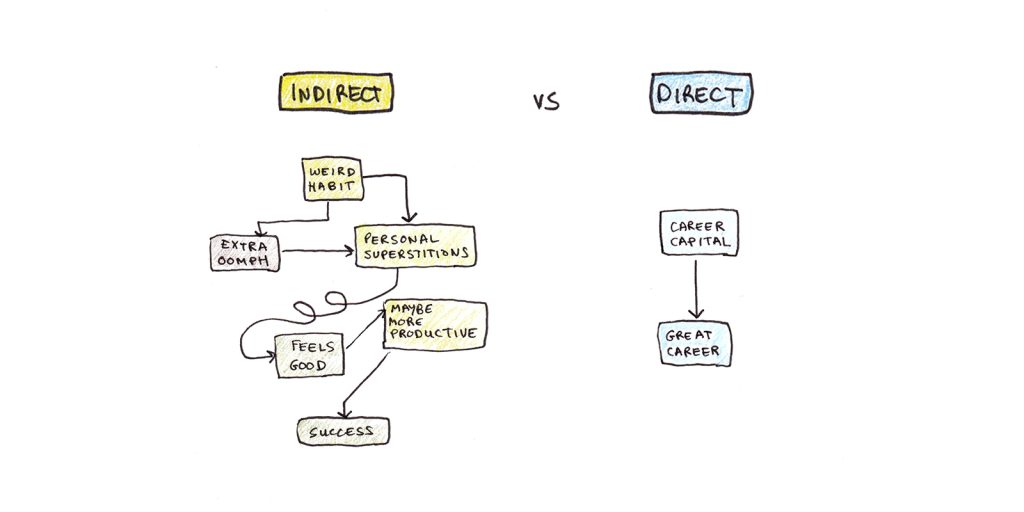A pet peeve of mine is self-help advice that obsesses over irrelevant personality quirks rather than the true drivers of a person’s success.
- Hedge fund billionaire Ray Dalio meditates forty minutes per day.
- Tim Ferriss wrote his bestselling books between 10 pm and 5 am.
- Warren Buffett famously drinks five cans of Coca-Cola every day.
- And so on …
There isn’t any secret diet, exercise, meditation or journaling exercise that will make you successful. Warren Buffett isn’t rich because of his junk food diet; he’s rich because he is an incredibly skilled investor who has worked continuously for nearly eight decades.
What Really Drives Successful Careers
Look, there’s nothing wrong with daily meditation, finding your most productive time to work or drinking colas. (Okay, maybe that last one isn’t so great … )
Instead, my misgiving with this kind of advice is that it’s focused on behaviors that are, at best, indirectly related to a person’s career success. Maybe Ray Dalio is right, and meditation makes him more productive—or maybe he’s just really good at being a hedge fund manager.

A better way to analyze the drivers of success among top performers is to examine their career capital. These are the assets they have that directly produce value for their employers, clients or customers:
- Skills. If you can do work few other people can, or you can do it better than most people, you have a powerful bargaining chip when looking for work. People with rare and valuable skills can set off bidding wars in negotiations, whereas people with mediocre levels of common skills usually cannot.
- Connections. Relationships can also be an asset. A journalist with a long career can often get a book deal, not only because she’s spent years honing her writing skills, but also because she knows tons of people throughout the publishing industry who can talk about her book.
- Reputation. How do you choose which products to buy? Chances are you don’t buy each possible option and test them at home before returning all but your favorite. Instead of relying on reviews, you pick brands that are high-quality for their price range and ask people you know. The same is true when people hire you.
Career capital explains success in a way that incidental habits cannot. While it’s easy to find examples of people who attribute their success to a particular behavioral quirk, it’s also easy to find plenty of cases where people with the same behavior don’t achieve such success.
In contrast, if someone has a successful career, they’re virtually guaranteed to have a lot of career capital.
How to Build Career Capital
Career capital comes in different flavors, and we’ve already discussed three: skills, connections and reputation.
Among these assets, skill tends to come first.1
Connections are nice if you’re born into a wealthy family, or went to an elite private school and have a great network. But if you don’t, knocking on the doors of random successful people, hoping they’ll be your friend and help you out, is not a strategy most people can pull off.
More commonly, connections follow from doing good work. When you make a name for yourself as being excellent at what you do, people will want to get to know you.
Similarly, reputation often matters more than raw ability. But, as with connections, reputation is a natural by-product of doing excellent work. Reputation follows skill, not the other way around.
Skills also have the benefit of being trainable. While good looks, family money or famous friends may be valuable career assets, they’re not always accessible if you don’t stumble into them.
Anyone can improve their portfolio of skills that can improve their career.
Come Build Career Capital with Cal Newport and Me in Top Performer
For the last eight years, Cal Newport and I have been running a private course, Top Performer, helping people cultivate rare and valuable skills for their work. If you’re interested in building the assets that actually drive success in your career (and ignoring the things that don’t), we’d love for you to join our next session, beginning next week.


 I'm a Wall Street Journal bestselling author, podcast host, computer programmer and an avid reader. Since 2006, I've published weekly essays on this website to help people like you learn and think better. My work has been featured in The New York Times, BBC, TEDx, Pocket, Business Insider and more. I don't promise I have all the answers, just a place to start.
I'm a Wall Street Journal bestselling author, podcast host, computer programmer and an avid reader. Since 2006, I've published weekly essays on this website to help people like you learn and think better. My work has been featured in The New York Times, BBC, TEDx, Pocket, Business Insider and more. I don't promise I have all the answers, just a place to start.